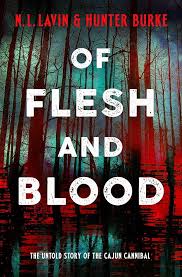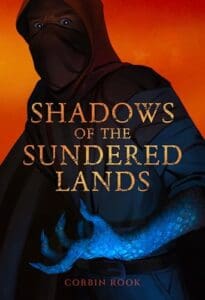
Synopsis:
In 2008, a serial killer known as the Cajun Cannibal brutally murders and consumes the flesh of eight people in a small Louisiana parish. With law enforcement closing in on him, he takes his own life before he can face the inside of a courtroom.
Ten years later, when forensic psychiatrist Dr. Vincent Blackburn discovers he and the Cajun Cannibal are more closely connected than he realized, he begins a case study into the sociopathy behind the killer’s grisly deeds, only to find a torrent of small town politics, interracial family dynamics, and whispers of the supernatural muddying once clear waters.
When copycat killings start anew, Vincent is thrust into the center of it all, putting his life, his family, and his own sanity at risk. As monsters—both figurative and literal—begin to manifest, Vincent discovers that untangling the truth from the lies is only the beginning of his nightmare.
Review:
A southern-fried, speculative sensation, N.L Lavin and Hunter Burke’s “Of Flesh and Blood,” is a well-seasoned slab of Cajun horror, simmered low and slow in the Louisiana heat. This horrifying gumbo of small town politics, local folklore and Acadian culture is of course, essential reading irrespective of whether you’re down on the bayou, or, like yours truly, a completely oblivious and woefully under-qualified Brit nearly 5000 miles away, whose point of reference is seafood boil and hot sauce. A novel that reads like true crime “Of Flesh and Blood,” is brooding and blistering and who’d have guessed, bloody. Complete with a complex cast of characters, and more twists than a bowl of fusilli in a tornado, this sinewy triumph (along with the Cajun Cannibal, so watch yourself) is out June 10th from Titan in the UK (thank you for my ARC) and Crooked Lane Books in the US.
We follow Dr. Vincent Blackburn, a psychiatrist studying the murders of the infamous Henri Judice, better known to the public and tabloids as the Cajun Cannibal, in 2008, 10 years down the line. His research raises a whole host of pressing questions. How was Judice able to kill so many, for so long? How were so many signs missed by the local sheriff’s department? In fact, the more Blackburn looks into it, the flimsier concrete answers become. Unclear motives. Muddled timings. Tampered evidence. No longer believing the narrative that Judice was a psychopath, Blackburn’s own mental (and physical) health is put in jeopardy. Was he really a cold-blooded monster? Or just a convenient one? Could it really be that the world is wrong about the identity of the Cajun Cannibal… or is blood thicker than water?
“Of Flesh and Blood,” drags the reader boots first into this tangle between academia and ancestry. It’s a situation that can only be described as awkward. Blackburn initially approaches the case of the Cajun Cannibal with a textbook detachment, the way one might examine a specimen under glass, having been trained to reduce trauma to neat conclusions and thesis topics. Theory quickly crumbles under the weight of blood however, and what he finds is not easily filed away. It’s this that makes “Of Flesh and Blood,” so much more than a piece of crime fiction with horror trappings. An autopsy of not just the mind of an *alleged* killer, but the place he grew up in and the family that raised him, Lavin and Burke discuss small town trauma, politics and memory, and various other flaws beneath that Southern charm.
The road that Burke and Lavin veer down is not simply unexpected but unpaved, unlit and flanked by dense South Louisianan woodland. What starts as a tightly wound, procedurally uneasy thriller, gradually unfurls into something far stranger and older. There’s a central piece of regional folklore I wasn’t familiar with, and am now deeply obsessed with. This element is expertly deployed, not with a crash of thunder but a subtlety and restraint that makes it less of a shocking revelation and more of a slow, inevitable unearthing- despite its fantastical nature. And the ending? “Of Flesh and Blood,” will leave you pacing, and channelling your inner True Detective. Masterfully done.
If you like a calm, tidy reading experience, in which every thread is neatly tied and no blood gets on the carpet, “Of Flesh and Blood,” is simply not the book for you. If however you prefer your fiction fried dark, seasoned heavy and served with a side of the paranormal, you’re in for one hell of a treat. A narrative that writhes and twists and bites, and offers not one single easy answer, if you come armed with a corkboard, some red string and a strong stomach, you’re guaranteed to have a wonderful time. Compulsive, confounding and completely unforgettable, it’s safe to say that the weekend (I couldn’t help but binge-read) I spent in the bayou was one well spent.









Leave a Reply